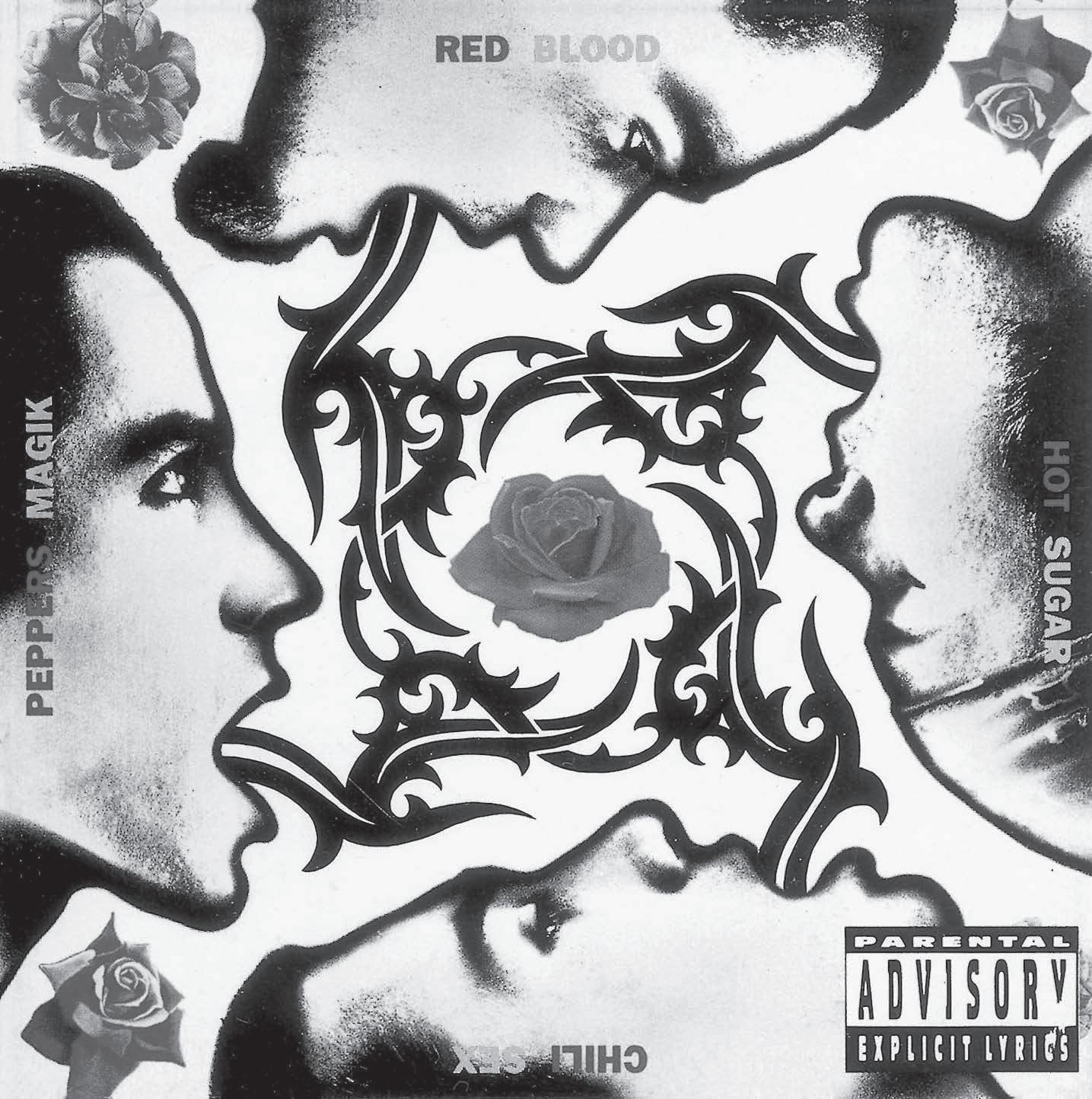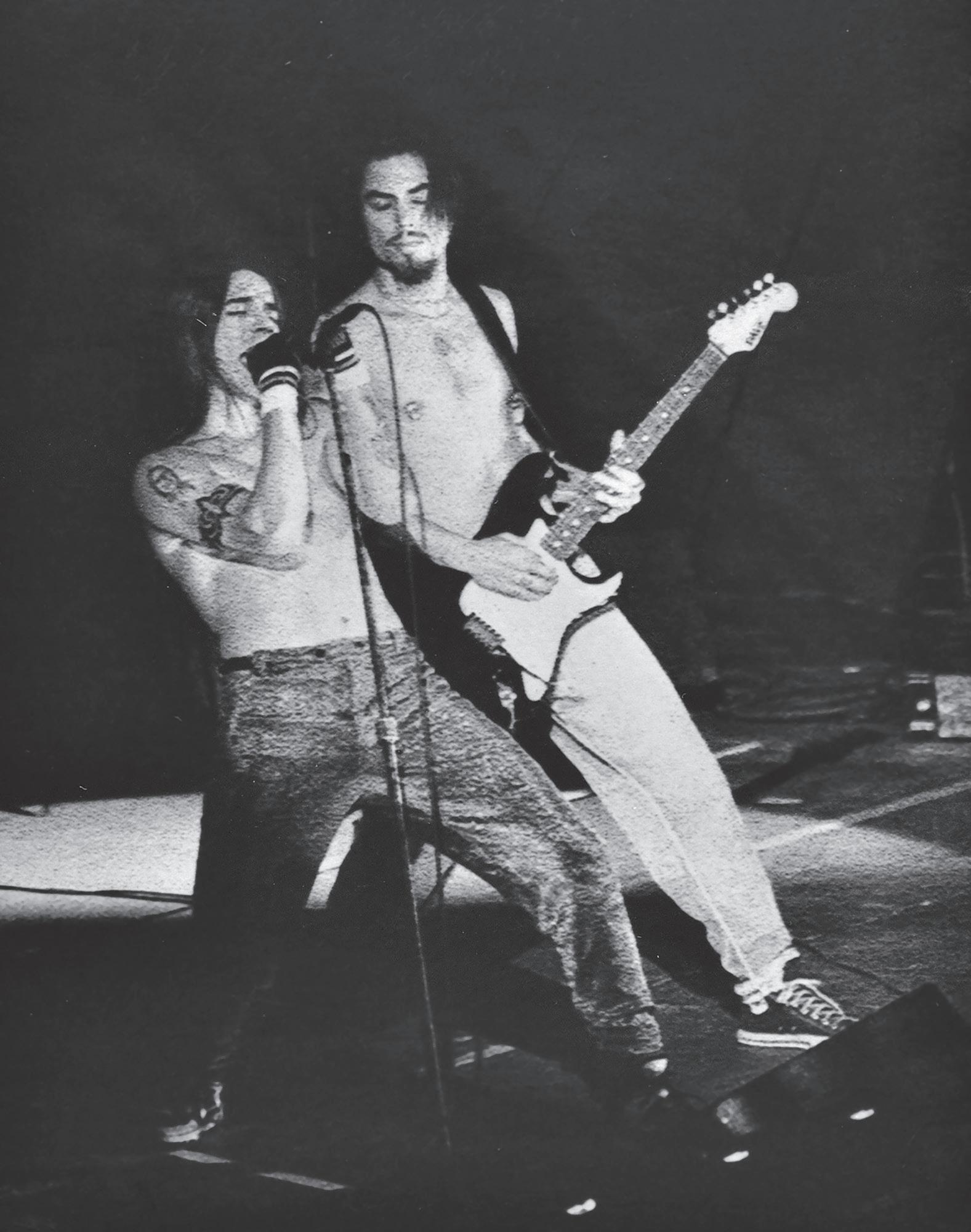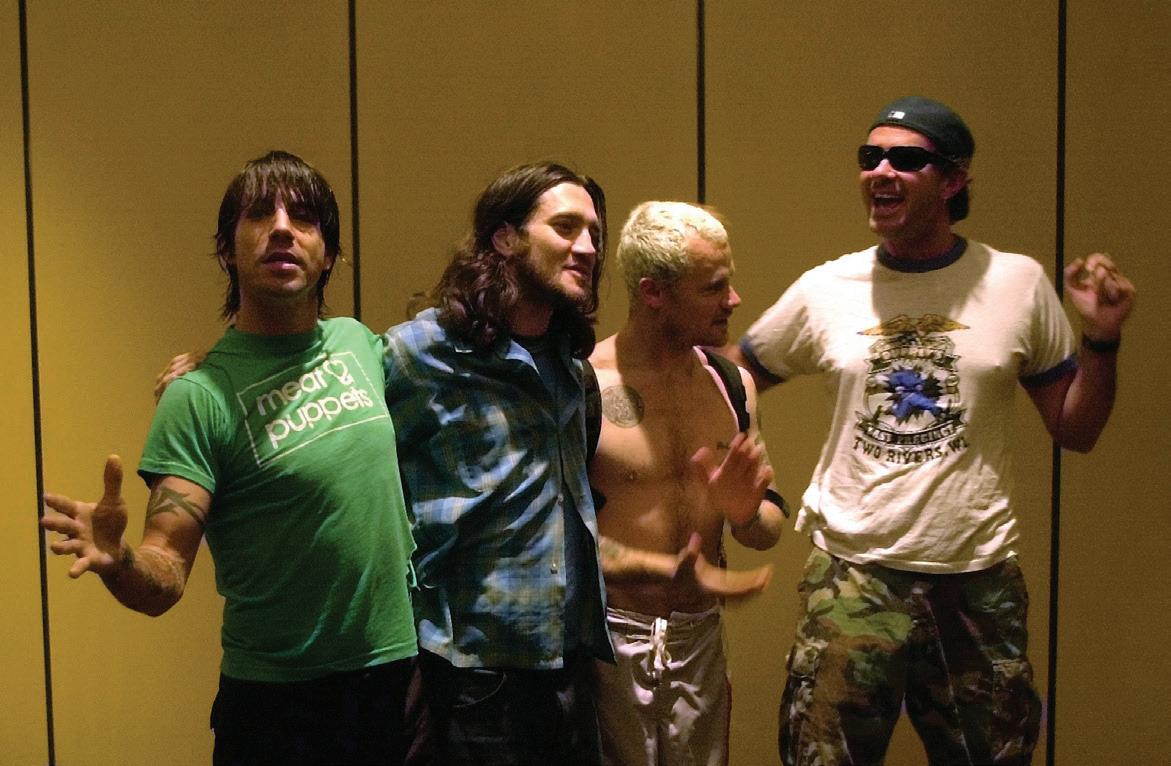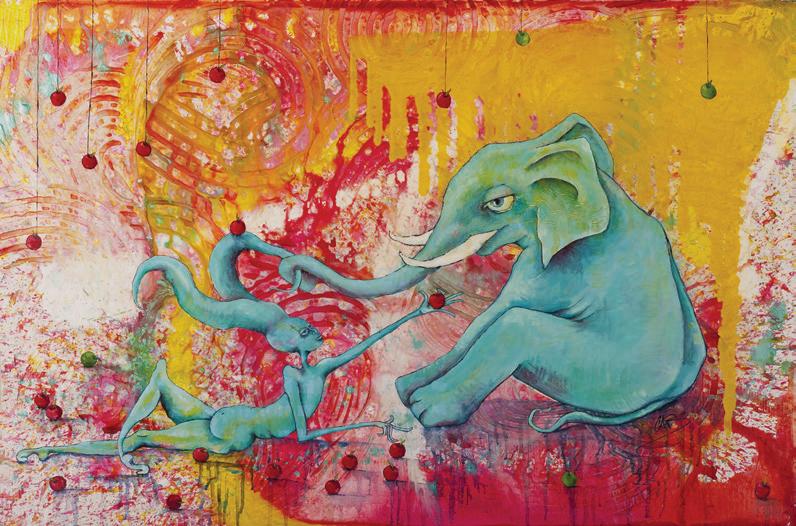
18 minute read
Featured
The Red Hot Chili Peppers (and the USA) have an Anthony Kiedis Problem ...
ALEX CHARALAMBIDES
Advertisement
Prologue: December 2019, seminal SoCal funk-punk darlings turned Grammywinning, 80 million recordselling rock megastars the Red Hot Chili Peppers announced the return of guitarist John Frusciante for a third stint with the band, preparing for a 2020 world tour, including a March 31 headlining date for the annual Boston Calling Music Festival. The show was canceled in March because of the COVID-19 pandemic. Throughout the band’s tumultuous 35-year career, the RHCP’s only constants have been acclaimed bassist Flea and rapper-turnedsinger Anthony Kiedis, best friends since high school who founded the band along with guitarist Hilel Slovak, who died from a heroin overdose in 1988, almost ending the band and cornering front man Anthony into his first attempt at sobriety. Guitar prodigy, high school dropout and number one Chili Peppers fan John Frusciante was selected to replace Slovak. He was 18 years old.
Frusciante returning to the Chili Peppers again almost got past me. The 1998 Alex would have pumped a tennis fist up in the air at such news, but like a lot of fans, I’d lost my enthusiasm since he left the band for a second time in 2009. For context, Frusciante’s entrance into the band scored them their first gold record for 1989’s “Mother’s Milk” and their first platinum breakout album, 1991’s “Blood Sugar Sex Magik,” launching the band into the mainstream and signaling the ’90s decade-long “alternative rock” era, with the lead single “Give it Away” released on Sept. 4, 1991, six days before Nirvana’s radio release of “Smells Like Teen Spirit.” Frusciante has been
voted one of the top 20 all-time rock guitarists by Rolling Stone Magazine. By comparison, the band’s 2011 record with guitarist Josh Klinghoffer, “I’m With You,” sold only 2.2 million copies, and 2016’s “The Getaway” sold a paltry 1.3 million.
But this isn’t really about the band’s waning sales or popularity. Not really. This is about mentorship and influence, about seeing a parallel to yourself in a rock star, and what happens when the toxicities of that rocker’s reality are laid bare.
1.
Dear Anthony Kiedis,
I’ve been thinking about second acts, about the decisions I’ve made and the forces that informed them. I’ve been thinking a lot about this country to which my family emigrated to as refugees. I’ve been thinking about influence and the fact that I didn’t have many chosen mentors growing up. My family was busy assimilating and working. My teachers were quick-study Pez dispensers for grades. Even my oldest brother, John, my protector and hero at the time, joined the Air Force when I was 12, guaranteeing that I would have no cool record collection to inherit. I was desperate for a voice to confirm that I wasn’t crazy for suspecting that reality, as presented to me through the framework of the United States of America, was some sort of beautiful lie. Like many firstgeneration Americans, almost every part of my childhood and adolescence was structured for me. No sleepovers at my American friends’ houses, a private all-boys high school. Most social interactions revolved around the church. My folks didn’t listen to music, read books for fun or go to movies or museums much. They were working extra hours, then extra hours on top of that, committing themselves to political organizing. The ironic dualities were astounding to me, even as a child. The person I spent the most time with was my grandmother, my YiaYia, who spoke zero English, my tri-lingually challenged mind mostly comprehending that she only wanted for me to be “good,” (then eat something) so I did and have been making that my primary occupation in life, through all the jobs, all the projects, I’ve been trying my damnedest to be good.
By 1990, the one area of my life that wasn’t strictly enforced was what I rocked on my headphones as I studied. One day, my 16-yearold sheltered self discovered an opportunity to grab a treasure trove of cassette tapes in one shot from the Columbia House Music Club, all for a penny! I finally had the freedom to take exciting chances and listen to stuff I might not have been able to afford otherwise. There were the standard rock tapes, but I was also enamored with rap and R&B, and then … there was this irresistibly manic sound blend coming from Southern California … The Red Hot Chili Peppers unwittingly became the music I chose to mentor me.
Because that’s what we’re talking about, right? Mentorship. Role models. Heroes. That’s what I was looking for, someone to tell me that thinking differently was not just OK, but necessary, righteous and joyful. At some point, I looked at the world and told myself “there’s something’s not quite right here. There’s gotta be something else.” It was more a suspicion than anything else. At the start of my poetry career, one of my favorite pieces to perform was about my search for a mentor: “I must be truly demented, I actually sent away in the mail for a ready made mentor,” never realizing I had subconsciously alluded to that record club purchase from years back.
So, Anthony, your band became my mentor. Whether you wanted it to or not. I was a teenager.


Anthony Kiedis, left, and guitarist John Frusciante of The Red Hot Chili Peppers in 2006.

I was at, what I like to call, a catchpoint, cognitively developed enough to engage with new ideas while young enough to fully run with them.
Now, I’m a 45-year-old straight cis-het white male poet and educa- tor, who’s approaching the 20th an- niversary of the first time I ever read a poem in front of strangers at the old Java Hut. We have some things in common: I’ve also mentored. Your band’s Boston Calling show got canceled, and the first annual Wicked Loud Youth Poetry Festival got canceled too. Wicked Loud is a re-imagined continuation of the spaces I’ve been helping to build for years through a nonprofit I co-found- ed (with poet Amanda Torres) called Mass LEAP. Hundreds of teens from across Massachusetts were slated to speak their stories into microphones, listen to one another and lift each other up, regardless of style, content or where they come from. Since 2003, these spaces have become my life’s work.
2.
I was bothered by how indiffer- ent I was to Frusciante rejoining the band, which I once would have seen as exciting news. MTV was shocked when Frusciante left the Chili Pep- pers mid-tour in 1992. I only knew of the fallout, the well-documented heroin hell ride he went on after leaving. It got dark. I wanted to get a better understanding of why Frus- ciante left in the first place, Anthony, so I bought a copy of your 2004, New York Times best-selling autobiogra- phy “Scar Tissue,” co-written with Larry Sloman, at the Lincoln Square Plaza Barnes & Noble and rewatched
AP PHOTO/CHRIS PIZZELLO
“Funky Monks,” the documentary about the recording of the seminal RHCP album, “Blood Sugar Sex Magik.”
The band had sequestered them- selves into a haunted mansion in the Hollywood Hills for two months and did nothing else but work on that acclaimed record. A teen musical prodigy, Frusciante was in prime form, creating electrifying chord progressions, a perfect pairing with a matured Flea, whose approach to playing evolved from showing off to a “listening first” mentality. They were alchemists producing a new language. It looked like wizardry. But then, Frusciante’s absolute mentee devotion to you was on full display in the film, like when he explained his process on the hyper erotic psych- adellic track “Sir Psycho Sexy”: “The main thought that I was concentrat- ing on in my head was that there was this really beautiful girl there at the studio and I was thinking ‘If Anthony doesn’t (expletive) tonight, then I’m not doing my job as a guitar player.”
He idolized your band for years before he joined. He was a shy guitar nerd who finally found a big brother. He sought your approval. But Anthony “can’t stop, addicted to the shin-dig” Kiedis, I know that you are an addict. At the time I discovered you, you were a recovered addict. And I know addiction is a disease and I fully empathize with those who struggle with that disease and have infinite love for my friends and peers in the recovery community and understand that an important part of your story is that of addiction and (mostly) overcoming that addiction.


“John was so young and inexperienced, he came in for a lot of good-natured ribbing,” you said in your book. Years later, Frusciante confided that it made him “incredibly self-conscious,” and to the best of your hind-sight, you still believed it was all a sign of love and respect to make him feel included. “If you look at it like, whose phone number are you dialing the most and who are you sharing the most experiences with, it was clear I was completely in admiration of this young man.”
You’d made the band your ad
diction when you got clean. All he wanted was to be in the best band in LA and make music with a family. It got too much too quick and he had to go … or else he was “going to die.” Your expectations and needs and need silenced him. You replaced him as fast as you could and kept touring. You didn’t connect for years, and upon learning that Frusciante had gotten clean and with Flea introducing the idea that he might be interested in rejoining the band, the two of you were finally going to hash it out.
“We went to the Farmer’s Market, one of my favorite places in LA, and sat down for some salmon tacos. I broke the ice. ‘Do you have a problem with me about anything?’ ‘No not really’ he said, ‘What about you, are you mad at me for anything?’ I thought I was but I don’t feel mad right now. I thought we should probably go over all this stuff but I don’t feel bothered by it anymore.’ ‘Me neither,’ John agreed.”
3.
But nothing can stop you alt-bro! I’ve spent the last couple weeks gutting my nauseous way through your poorly written tome. Like, how did the #MeToo Movement even miss you, even though you officially confess to instances of statutory rape in your own autobiography? I know I’m 16 years late to the book review press junket party, but I could write a book twice as long as yours, unpack every truth you failed to face in your stupid lucky Dionysian playground of a maniac life.

What’s still the most amazing thing to me, even more amazing than the fact that you’re still alive, or that he’s still alive, or your band is still alive, is the fact that even after you got clean, you couldn’t rock climb your way to any real self-reflections about yourself.
Your failure to understand your own origin point is crucial here. You describe your experiences living with your father in the ‘70s as a magical time. You proudly display pics of the first joint you smoked when you were 11 years old, with your pops and his 18-year-old girlfriend. Do you really not understand that spending your formative years serving as wing-man for your drug-dealer to the stars, party monster of a father perhaps caused you real harm? I’m no psychiatrist, not even overly moralistic, but it seems like you had every rehab opportunity to delve into the underlying traumas of your life with a trained therapist, but you passed, dismissed it as “psychiatric jargon.” Instead you idealized your father as a mentor who showed you true soul respect by allowing you to become his undying partner in literal crime.
That guy messed you up bro. Like … for real.
America is kind of over your band, especially the young people. I remember chaperoning and chauffeuring three teenaged genius poet mentees from a youth social justice conference at UMass Boston, dropping them off at their respective homes in different parts of the state, after securing honorariums to perform for their peers. I usually encourage them to take over my USB cable to play whatever music they want, but on this day for some reason, low cell batteries left us with what was in my CD player, one of your records. A 16-year-old, first-generation Haitian American poet bopped her neck up from the back seat upon recognizing a blazing funk bass line and asked, “who is this?” By the time I was done answering, you started rabid scatting some semi-intelligible lyric, and the learning moment was over. She was over it.
I work with a lot of young people. I do not know one young person who loves your band. I also don’t know one young person who fully trusts Generation X to have their back, while they’re forcing long overdue conversations on white supremacy, patriarchy, toxic masculinity, homophobia and transphobia.
Our nonprofit has a theory of change logic model, as best as I can describe, it’s a process through which an organization comes to understand the why and the how of their work, naming the inputs and outcomes to develop a vision statement. Mass LEAP’s theory of change includes adults as participants who are also changed by the process of interaction through brave and safe arts spaces. Until recently, I’ve never focused enough on how I’ve come to embody this theory of change, too. These young people’s brilliance and perspectives and care have changed me to the point where I didn’t write poems for years, because I valued their voices so much over mine. I’m lucky. I unpacked a lot. I’m grateful to them. I will always work for them.
Revisiting “Funky Monks,” I happened upon a deleted scene I’d never seen before, a quiet meditative moment where a young Frusciante teaches you how to sing the chorus for “Under the Bridge,” a throw-away Anthony addiction poem that producer Rick Rubin insisted was actually a song. A song that catapulted you past the fame stratosphere. The first No. 1 hit! That young person had
Anthony Kiedis, left, and Dave Navarro of The Red Hot Chili Peppers perform at the Worcester Centrum in 1996.

STAFF FILE PHOTO
to teach you how to actually sing your own story. “No, Anthony, like this … ( falsetto) “Under the Bridge Downtown … Is where I drew some blood … ”
Anthony, you spent the first third of your career speed-rapping clownishly on cocaine. It was a scene. Frusciante’s ascendancy in particular, and the dynamic with Flea he created within the band, taught you melody, if not directly shaping your scribblings into something that sounded like music. And sure, you worked on it. You’re better at it now. You are a privileged alt-bro who was allowed and encouraged to develop your craft by patient geniuses who saved you … over and over again; because friendship? guilt? potential? fear? Who actually knows? The only thing I do know for sure, is that it kept going … and it keeps going, as you sang in “Can’t Stop,” “Ever wonder if it’s all for you?”
4.
And isn’t that effectively America, generation after generation of entitled white straight cis-het men acting recklessly, then viciously punishing the people they rely on the most, and then claiming they’re not aware of what the problem even is?
Anthony, no one’s ever checked you, or had the power to check you properly and that started at home, which is real. I agree with the notion that hurt people hurt people. Seems you still need to hit the kind of rock bottom clarity that would make you even see the real problem and/or ask for real help to understand that you fundamentally don’t even understand the problem.
Not everyone’s a mentor. I’ve needed to evolve and educate myself and am constantly questioning whether or not I’m doing the best job I can do. But it seems your brand of mentorship was a constant hunt for some developmentally challenged hunger you were raised into, whether your bandmates fell under your spell in high school, experimented with stronger drugs, jumped off buildings into swimming pools, or just followed your musical tastes, to the myriad — again, I really can’t believe I have to point this out — seriously underaged girls that you preyed upon, that you laid a lifetime of unchecked angst on, in the name of some karmic connection. The toxicity oozes from each page in
your book to the point where I wanna rinse my eyeballs in pandemic hand sanitizer.
In the 1993 Quentin Tarantino scripted film “True Romance,” Christopher Walken’s gangster character interrogates Dennis Hopper for information, explaining the pantomimes of liars. “Right now you’re playing a game of ‘show and tell’, like you’re telling me everything, but you’re showing me nothing” — and I challenge you, Anthony, to show us something other than your addictions, including an addiction to painting yourself as the hero in your story. You do habitually humble brag throughout your book about your ability to lie and manipulate people.
There’s too much at stake right now for this newest generation and for all of us. They are literally in these streets and schools and institutions trying to resolve a simple historical truth that this country has ignored for the entirety of its “post-racial” history. The origin point that too many deny is white supremacy and that its imprint is still alive in all of our systems. In your book, you brag about your social awareness, then decide that the Chilis were never going to be a political band. Even now, I don’t think I’ve seen a cursory #Black Lives Matter support statement on your band’s website or social media. My thesis here is that you’ve never had the capacity for actual mentorship, so the best thing you might do now, take it from me, is to take a step back, like all the way back.
It might save rock n’ roll.
It might inspire clever, sardonic, “reality bites,” “slacker,” sarcastic Generation X to pick up our tools and help the young people more, instead of telling them to get off our newly acquired lawns. A lot of us are realizing or beginning to realize that we didn’t honestly earn all that we have. And right now we have so much, like some knowledge and some naming (the young people are so good at naming things) and some resources and enough energy to aid the demands for actual systemic change. If we don’t help them or offer authentic respectbased mentorship, or accept their mentorship, then we risk them being drained and losing the spark and they may not actually even be interested in helping us save ourselves.
I’ve been going to the park to run and do pushups every day. I’m eating vegetables for breakfast bro. I’ve become a hydration fascist and read books instead of the internet. I’m trying to get back to basics, build


Red Hot Chili Peppers band members from left: Anthony Kiedis, John Frusciante, Michael “Flea” Balzary, and Chad Smith pose for photographers during a press conference in San Jose, Costa Rica, Tuesday, Oct. 1, 2002. The Red Hot Chili Peppers arrived in Costa Rica on a stop on their world tour to promote their new album “By the Way.”

AP PHOTO/KENT GILBERT
stamina in an effort to create solid action plans for being the best human I can possibly be for the second half of my privileged Gen-X life. And to support that, I’ve needed to look at and understand and name every toxic system and perception that raised me, including every mentor I chose to engage with. A young poet helped me understand that once we understand what the problem is, we can finally seek real wellness, heal, find freedom, or at least enough to do something about it, instead of living in a self perpetuating cycle of harm.
ARTIST SPOTLIGHT CITY LIFE
If you are an artist, or know of a local artist, email WMeditor@gatehousemedia.com. Fair warning, in order to publish your work, you’ll need to provide a small bio and high resolution digital copies of some of your art. We reserve the right to choose what will run, based on resolution and what will reproduce best on newsprint. artists Let us feature your artwork

in Worcester Magazine’s
Artist spotlight! Email
WMeditor@gatehousemedia.com A U G U S T 15 for more information!
- 21, 2019
W O R C E S T E R M A G A Z I N E . C O M 17 Colette Aimée is the daughter of an actor and a ballerina. Throughout her upbringing Aimee had all kinds of art flowing in and out of her life in the small town of Kent, New York. Musicians, ac tors, dancers, poets, painters and aristocrats were many of the influences that Colette took in to create the artist that she is today. Aimee found herself going on to art school at SUNY New Paltz in New York, receiving her BFA in 2006. She now shows all over the country in gallery shows and events as well as at various music and arts festivals. She continues to surround herself with the same types of creative people which inspire her to paint the luminous colors of her surrealistic world. For several years now she has been working with the idea of the Harlequin, a magical being that can change itself and the world that surrounds it. These esoteric Harlequins are sexual, playful and sometimes devious in their thoughts of traveling beyond the boundaries of our world and their own to reach tremendously elastic points of views. Check out more of her work at rawartists.com/coletteaimee or at the following events: Spencer Street Party in downtown Spencer: Aug. 24, Wormtown Festival: Sept. 13-15 in Greenfield. wanted










